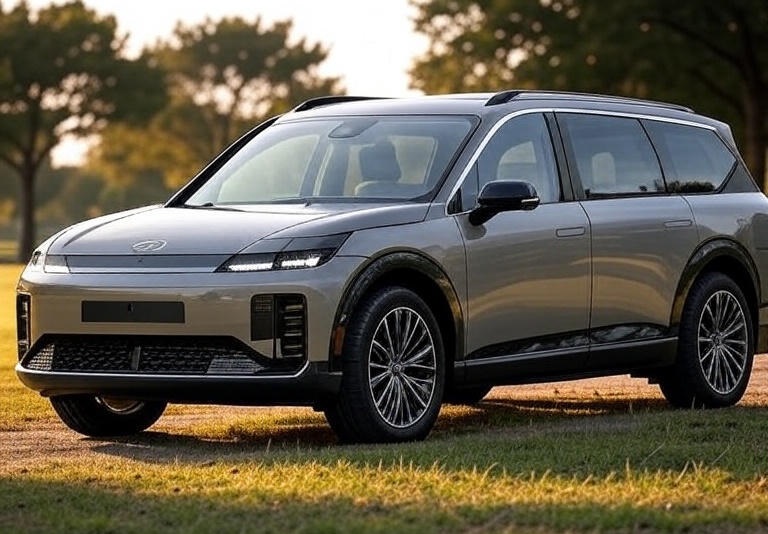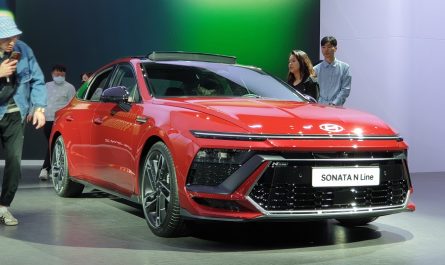2026 Hyundai Ioniq 7: The Future of Family Electric SUVs
The 2026 Hyundai Ioniq 7 is poised to redefine the electric vehicle landscape as Hyundai’s latest addition to its acclaimed Ioniq lineup. This three-row electric SUV draws inspiration from the visionary Hyundai Ioniq 7 concept, promising a blend of cutting-edge technology, spacious design, and eco-friendly performance.
As families seek sustainable alternatives to traditional gas-guzzlers, the 2026 Hyundai Ioniq 7 emerges as a frontrunner, offering impressive range and innovative features tailored for modern lifestyles. With its roots in Hyundai’s Electric-Global Modular Platform (E-GMP), this model ensures efficient power delivery and rapid charging capabilities, making it a practical choice for daily commutes and long road trips alike.

Hyundai Ioniq 7 Release Date:
Anticipation builds around the Hyundai Ioniq 7 release date, with production slated to begin in mid-2025 at Hyundai’s dedicated EV facility in Georgia, USA. While initial unveilings and concept teases date back to 2021, the production model—now aligned under the Ioniq branding—targets U.S. dealerships in the first half of 2026.
This timeline allows Hyundai to refine its battery tech and integrate advanced driver-assistance systems (ADAS) for a seamless launch. For those eyeing this electric SUV, early reservations could open by late 2025, ensuring priority access amid high demand. The delay from earlier 2024 projections reflects Hyundai’s commitment to quality, incorporating feedback from the Ioniq 5 and 6 successes.
Evolution from the Hyundai Ioniq 7 Concept:
The Hyundai Ioniq 7 concept, first showcased at the 2021 Los Angeles Auto Show as the “SEVEN,” set the stage for this groundbreaking electric SUV. This visionary prototype featured a retro-futuristic aesthetic with parametric pixel LED lights, a low-slung hood, and an elongated wheelbase for optimal aerodynamics.
Production tweaks toned down some extravagances—like suicide doors and a fully lounge-style cabin—but retained the boxy, spacious silhouette reminiscent of classic MPVs. The 2026 model measures approximately 199 inches in length with a 123-inch wheelbase, prioritizing family-friendly proportions over the concept’s more whimsical elements. This evolution ensures the Hyundai Ioniq 7 electric SUV remains visually striking while being road-ready, with active air flaps on wheels enhancing efficiency.
Hyundai Ioniq 7 Interior:
Delving into the Hyundai Ioniq 7 interior reveals a cabin designed for comfort and versatility, accommodating up to seven passengers in a flat-floor layout courtesy of the E-GMP platform. Expect a minimalist dashboard with a curved dual-screen setup for infotainment and gauges, supporting wireless Apple CarPlay and Android Auto. The “Universal Island 2.0” sliding center console—borrowed from the concept—offers flexible storage and a 27-inch deployable display for rear entertainment, turning the space into a mobile lounge. Sustainable materials like recycled PET fabrics and bio-based paints underscore Hyundai’s eco-focus, while features like UVC sterilization lights ensure hygienic travel post-pandemic.
Second-row captain’s chairs or benches provide ample legroom, with third-row access eased by a walk-through design. Cargo space starts at 21.9 cubic feet behind the rearmost seats, expanding to 86.9 cubic feet when folded—surpassing rivals like the Kia EV9. Ambient lighting and a panoramic glass roof enhance the airy feel, making this interior a standout for family-oriented EV buyers. Variations on “spacious EV cabin” and LSI keywords like “lounge seating” emphasize its premium appeal.
Performance and Range:
As a dedicated Hyundai Ioniq 7 electric SUV, this model prioritizes zero-emission driving with dual-motor all-wheel drive (AWD) options delivering up to 303 horsepower and 515 lb-ft of torque. The base rear-wheel-drive (RWD) variant hits 0-60 mph in under 5 seconds, while towing capacity reaches 5,000 pounds for AWD trims—ideal for trailers or boats. A 110.3 kWh nickel-cobalt-manganese (NCM) battery pack promises an EPA-estimated 311-335 miles of range, depending on configuration, with 92 MPGe efficiency in city driving.
Ultra-fast charging via the NACS port (compatible with Tesla Superchargers) adds 10-80% in just 24 minutes at 350 kW. Regenerative braking and vehicle-to-load (V2L) functionality allow powering external devices, extending its utility. Compared to gas counterparts like the Palisade, the 2026 Hyundai Ioniq 7 offers lower operating costs and a class-leading 10-year/100,000-mile powertrain warranty. Terms like “all-electric three-row SUV” and “long-range EV” naturally integrate to avoid repetition.
Pricing, Safety, and Why It Stands Out
Expected to start around $55,000 for the base S trim, the 2026 Hyundai Ioniq 7 undercuts luxury rivals like the Rivian R1S while matching features. Safety suite includes automated emergency braking, blind-spot monitoring, and Level 3 autonomy readiness via facial recognition cameras. Its Georgia-built production qualifies for U.S. tax incentives, boosting affordability.
Conclusion:
In summary, the 2026 Hyundai Ioniq 7 stands as a testament to Hyundai’s forward-thinking approach in the EV space, seamlessly integrating the essence of the Hyundai Ioniq 7 concept into a production-ready electric SUV. Whether you’re drawn to its anticipated release date, luxurious interior, or superior range, this vehicle promises to elevate family adventures while championing sustainability. As electric mobility evolves, the 2026 Hyundai Ioniq 7 invites you to experience the future today—efficient, innovative, and undeniably exciting.


